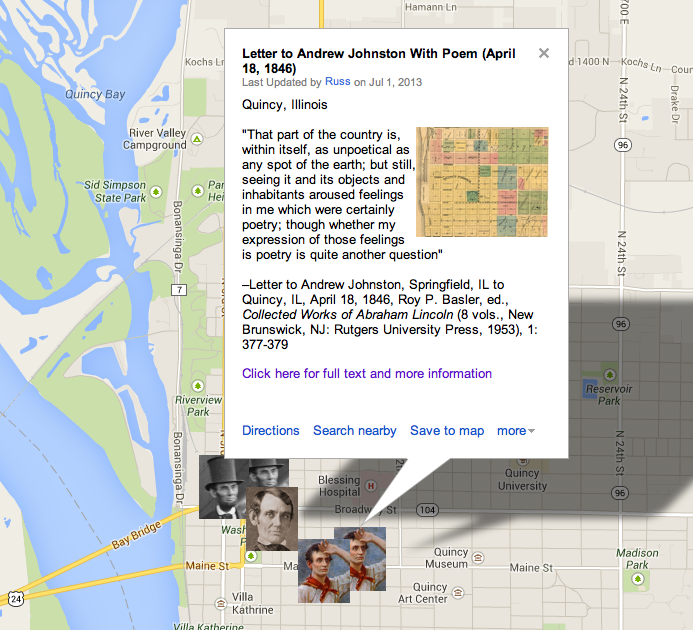Contributing Editors for this page include Todd Jansson
Ranking
#134 on the list of 150 Most Teachable Lincoln Documents
Annotated Transcript
On This Date
HD Daily Report, April 18, 1846
The Lincoln Log, April 18, 1846
Close Readings
Todd Jansson, Understanding Lincoln blog post (via Genius), 2016
Custom Map

View in Larger Map
How Historians Interpret
“In Indiana Lincoln was home again. Even as he stumped politically, he was thinking poetically. “That part of the country,” he later wrote a friend, “is within itself, as unpoetical as any spot of the earth; but still, seeing and its objects and inhabitants aroused feelings in me which were certainly poetry.”
— John C. Waugh, One Man Was Great Enough: Abraham Lincoln’s Road to the Civil War (Boston: Houghton Miffin Harcourt, 2007).
“He preferred such lugubrious woks as the poem “Mortality” by William Knox. ‘I would give all I am worth, and go into debt, to be able to write so fine a piece as I think that is,’ he said in 1846. Lawrence Weldon observed him, at day’s end on the circuit, sit ‘by the decaying embers of an old-fashioned fire-place’ and ‘quote at length’ from ‘Mortality.’ He told friends that Knox’s verses ‘sounded to him as much like true poetry as anything he had ever heard.’ Evidently he first made its acquaintance in New Salem but came to love it intensely after visiting southwestern Indiana during the 1844 presidential campaign. He described that trip as a visit to “the neighborhood in that State where I was raised, where my mother and only sister were buried, and from which I have been absent about fifteen years.”
—Michael Burlingame, The Inner World of Abraham Lincoln (Champaign: University of Illinois Press, 1997), 108.
NOTE TO READERS
This page is under construction and will be developed further by students in the new “Understanding Lincoln” online course sponsored by the House Divided Project at Dickinson College and the Gilder Lehrman Institute of American History. To find out more about the course and to see some of our videotaped class sessions, including virtual field trips to Ford’s Theatre and Gettysburg, please visit our Livestream page at http://new.livestream.com/gilderlehrman/lincoln
Searchable Text
Tremont, April 18, 1846.
Friend Johnston:
Your letter, written some six weeks since, was received in due course, and also the paper with the parody. It is true, as suggested it might be, that I have never seen Poe’s “Raven”; and I very well know that a parody is almost entirely dependent for its interest upon the reader’s acquaintance with the original. Still there is enough in the polecat, self-considered, to afford one several hearty laughs. I think four or five of the last stanzas are decidedly funny, particularly where Jeremiah “scrubbed and washed, and prayed and fasted.”
I have not your letter now before me; but, from memory, I think you ask me who is the author of the piece I sent you, and that you do so ask as to indicate a slight suspicion that I myself am the author. Beyond all question, I am not the author. I would give all I am worth, and go in debt, to be able to write so fine a piece as I think that is. Neither do I know who is the author. I met it in a straggling form in a newspaper last summer, and I remember to have seen it once before, about fifteen years ago, and this is all I know about it. The piece of poetry of my own which I alluded to, I was led to write under the following circumstances. In the fall of 1844, thinking I might aid some to carry the State of Indiana for Mr. Clay, I went into the neighborhood in that State in which I was raised, where my mother and only sister were buried, and from which I had been absent about fifteen years. That part of the country is, within itself, as unpoetical as any spot of the earth; but still, seeing it and its objects and inhabitants aroused feelings in me which were certainly poetry; though whether my expression of those feelings is poetry is quite another question. When I got to writing, the change of subjects divided the thing into four little divisions or cantos, the first only of which I send you now and may send the others hereafter.
Yours truly,
A. LINCOLN.
My childhood’s home I see again,
And sadden with the view;
And still, as memory crowds my brain,
There’s pleasure in it too.
O Memory! thou midway world
‘Twixt earth and paradise,
Where things decayed and loved ones lost
In dreamy shadows rise,
And, freed from all that’s earthly vile,
Seem hallowed, pure, and bright,
Like scenes in some enchanted isle
All bathed in liquid light.
As dusky mountains please the eye
When twilight chases day;
As bugle-notes that, passing by,
In distance die away;
As leaving some grand waterfall,
We, lingering, list its roar—
So memory will hallow all
We’ve known, but know no more.
Near twenty years have passed away
Since here I bid farewell
To woods and fields, and scenes of play,
And playmates loved so well.
Where many were, but few remain
Of old familiar things;
But seeing them, to mind again
The lost and absent brings.
The friends I left that parting day,
How changed, as time has sped!
Young childhood grown, strong manhood gray,
And half of all are dead.
I hear the loved survivors tell
How nought from death could save,
Till every sound appears a knell,
And every spot a grave.
I range the fields with pensive tread,
And pace the hollow rooms,
And feel (companion of the dead)
I’m living in the tombs.

